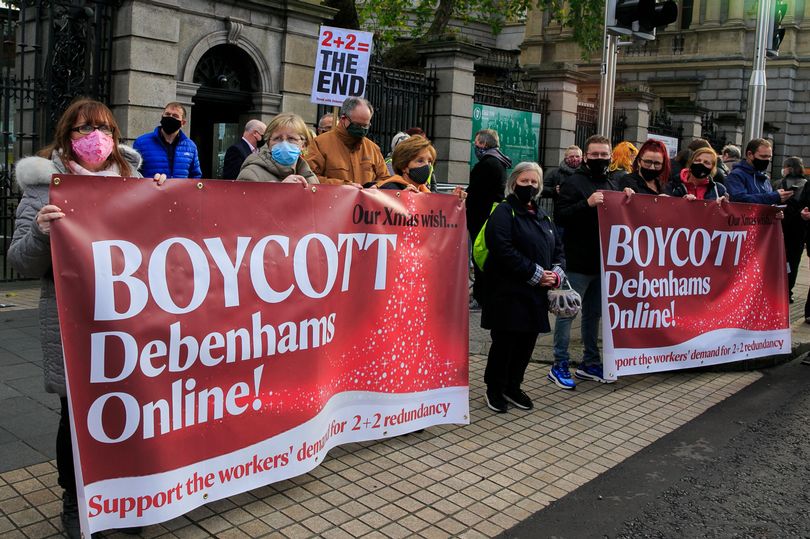By Michael O’Brien
This week, the Workplace Relations Commission (WRC) communicated its decision to the Mandate Trade Union and the Court-appointed liquidators in a test case taken by former Henry Street branch shop steward Jane Crowe.
Disgracefully, the decision was leaked to the media before the former Debenhams workers even had sight of it. The leak said the decision was largely favourable to the workers and ultimately should result in around €2 million plus being paid out in total to them.
The complaints
The complaints heard at the WRC revolved around the company and the liquidator not meeting certain legal obligations in terms of consultation and information in collective redundancy situations.
Complaints were made under two sections of the Protection of Employment Act, 1977. Section 9 provides for a 30-day consultation between an employer and employees and their representatives, which must commence in ‘good time’ once the employer is contemplating redundancies of a certain scale.
Section 10 obliges the company to engage meaningfully with the employees and provide relevant information. The whole purpose of this information and consultation process is supposed to create the space for discussing alternatives to the scale of job losses and other mitigations.
Complaints under both Section 9 and 10 of the Act were made by the workers against both the employer and the liquidator, making four complaints in total. However, the adjudicator decided that there was only one consultation process and that only two complaints could be heard.
The adjudicator upheld the complaints under both sections of the Act. He found that the process of consultation ought to have commenced immediately once the decision was made by the company on 9 April 2020 to make all staff redundant. Instead it was only after the appointment of the liquidator on 17 April that what transpired to be a sham process unfolded.
The adjudicator likewise found that not all relevant information was provided at the request of the workers and the union. Specifically, the claim by the liquidator that the online business in Ireland and the stock in the stores was owned by the UK parent and therefore could not figure in a survival plan for the Irish operation was rightly challenged. The company ignored requests to provide the union with copies of its legal advice on these matters, as well as copies of the lease agreements for the various stores and data on the performance of each of the stores individually.
The award and what happens next
The maximum four weeks’ pay for breaches of each of the two sections of the Act was awarded to Jane Crowe and all the workers, eight weeks’ pay in total.
The shop stewards and workers, on the basis of legal advice, need to weigh up within the next six weeks whether it is worth appealing the decision to the Labour Court, in particular to revisit the question of whether the company and the liquidator can be held separately liable. To win on this could mean the doubling of the awards.
Likewise the liquidator / company has the right to appeal the outcome to the Labour Court and have everything argued over a second time. If this happens it could add at least another year and a half to the process.
If there is no appeal to the Labour Court or assuming that the WRC award would be upheld or improved in a Labour Court appeal there is the question of how it will be paid. In all likelihood, given the passage of time and the liquidation having taken its course, the award will come out of the Department of Social Protection’s insolvency fund.
Conclusion
The former Debenhams workers deserve every cent that can be obtained and more besides for the struggle they have waged. Favourable results can be obtained for workers individually and collectively at the WRC when adjudicators are presented with strong evidence and testimony.
However, it takes on average a year for a case to go to hearing, sometimes a further six months to a year to be fully heard, and a further six months for decisions to be issued. This can then be appealed to the Labour Court adding a further 18 months to two years to the process.
This is clearly less satisfactory than what can be won in the immediacy of a strike or struggle. The ruling itself is a vindication of the importance the workers placed on the stock, which was extremely valuable and which the company tried to pretend was beyond its reach.
Employers looking at this ruling might cynically conclude that in similar circumstances they would put up with a future loss of eight weeks’ pay per employee on foot of a sham consultation process rather than concede in the midst of a struggle on questions such as saving jobs or honouring enhanced redundancy packages. Again, this underlines the importance of throwing everything into the struggle, a lesson the workers’ got but which needs to be heeded by the trade union movement as a whole.












